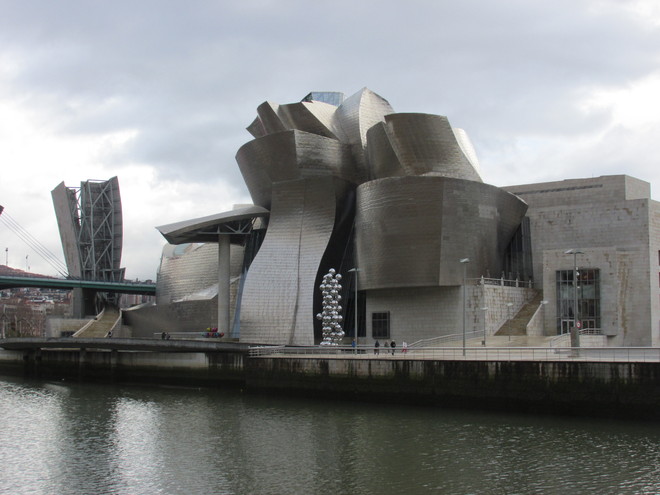
Guggenheim Museum
Ranjita Biswas
The first thing that strikes a chord when Bilbao is mentioned is its oft-mentioned Guggenheim Museum. It is a ‘must-visit’ for lovers of modern and contemporary art. Even if witnessed from outside, standing by the Nervion river, it is a stunning building and recognised as one of the most significant structures built in the 20th century. Canadian-American architect Frank Gehry designed this titanium-clad twisting, curving and angular building, which was opened in 1997. Before this, experts say, titanium was never used in a building. It has a maritime theme, supposed to represent the ships, along the docks of the city, with titanium squares acting as fish scales and the skylights inside designed to look like fish fins. A bouquet of colourful poppies in front of the museum from the riverside and a ‘puppy’ covered with plants are some of the most famous symbols of modern Bilbao.
Presently an exhibition “The Art of Our Time”, which will continue till May this year, is showcasing the masterpieces in its collection with works by Joan Miro, Chagall, Andre Masson, Pablo Picasso, etc.
Bilbao is in the Basque country in northern Spain, capital of the autonomous province of Bizkaia. The borough of Bilbao was founded in the early 14th century by a few influential families of Bizkaia, a Basque name. Basque is one of the world’s oldest languages and in this area both Basque and Spanish are recognised as official languages.
Unlike many other neighbouring towns and cities, Bilbao has been heavily industrialised for a long time due to the iron deposits in the surrounding areas and easy access to a port nearby on the Bay of Biscay. However, nestled among the green hills and the Nervion river, the city is not a conglomerate of grey factories; the place is replete with beautiful churches like Basílica de Begoña, cobbled-stone paths ringed by quaint shops and pubs in the old town, a serene promenade, along the river, and gourmet restaurants. Above all, the city is known for its architectural innovations, much like Chicago in America.
When guide Aitor Delgado suggested a visit to the two railway stations of the city, one was a bit surprised. What could be of interest in dull railway stations? But that even a railway station can be so beautiful one discovered soon. The Abando. Station, simply known as the north station to the locals, has a magnificent stained glass atrium, enough to take your breath away.
Nearby is the Santander station, which was built between 1898 and1902. The art nouveau façade is worth a look, though it seems to be less used today by commuters.
It started to drizzle and a warm cup of coffee seemed welcome. We dropped in at Café Iruna (near Abando station), a signature restaurant-cum-café operating since 1903. Inside it was gorgeous with Moorish Mudejar art décor and an ‘atmosphere’. We, however, settled for Caldo, a local broth, to keep away the cold. Just delicious.
Walking down the old quarter Casco Viejo we arrived near the 15th century San Antón church and a stone bridge by the same name. They are witnesses to the old trade route via the river and appear on the city’s coat of arm. Nearby is Mercado de la Rivera, built in 1929, supposed to be the biggest covered market in Europe. Fish, meat and vegetables are sold in the two-storey market, except on Sundays. Even if you don’t buy anything walk through the bustling market to get an introduction to local produce.
Another interesting place to explore is the Plaza Nueva square built in 1821 in Roman neoclassical style with arches and colonnades. All around are shops, souvenir stalls, restaurants and pubs to relax and enjoy. On Sundays, the big courtyard hosts an interesting market.
Stroll by the riverfront and while joggers pass by and elderly ladies walk their dogs, you will know why Bilbao’s architectural beauty is so admired. The buildings facing the river, like Hotel Hesperia with its multi-coloured windows creating a tiled effect, the graceful white footbridge Zubizuri designed by Santiago Calatrava, which spans the Nervión to connect the two river-walks, the graceful university building, all create an ambience both modern and serene.
This part of Bilbao was a later addition. A devastating flood in the 1980s left many establishments ruined and there was a high percentage of unemployment. The city fathers foresaw that the city had to reinvent itself and invited the Guggenheim Foundation of New York to set up a museum, and funds were raised. With the museum established and riverfront developed tourism soared.
On a clear day climb up the Mallona stairs to Parque Etxebarria for beautiful view of the city.
As a Spanish town, food as well as adda is important for the citizens. What better way to enjoy both with the bite-sized ‘pinxtos’ the local name for tapas as in other parts of Spain. Being near the sea, fresh fish dishes are always on the table like Bacalao al pil pil, a typical dish made of cod and accompanied with roasted potatoes, but multi-cuisine restaurants abound too.



























